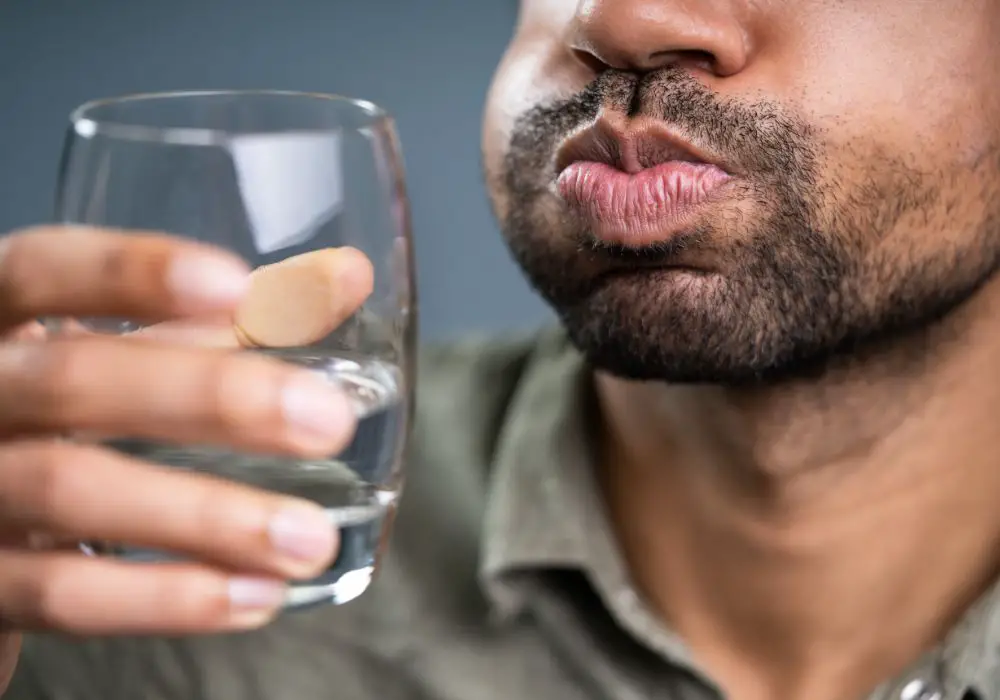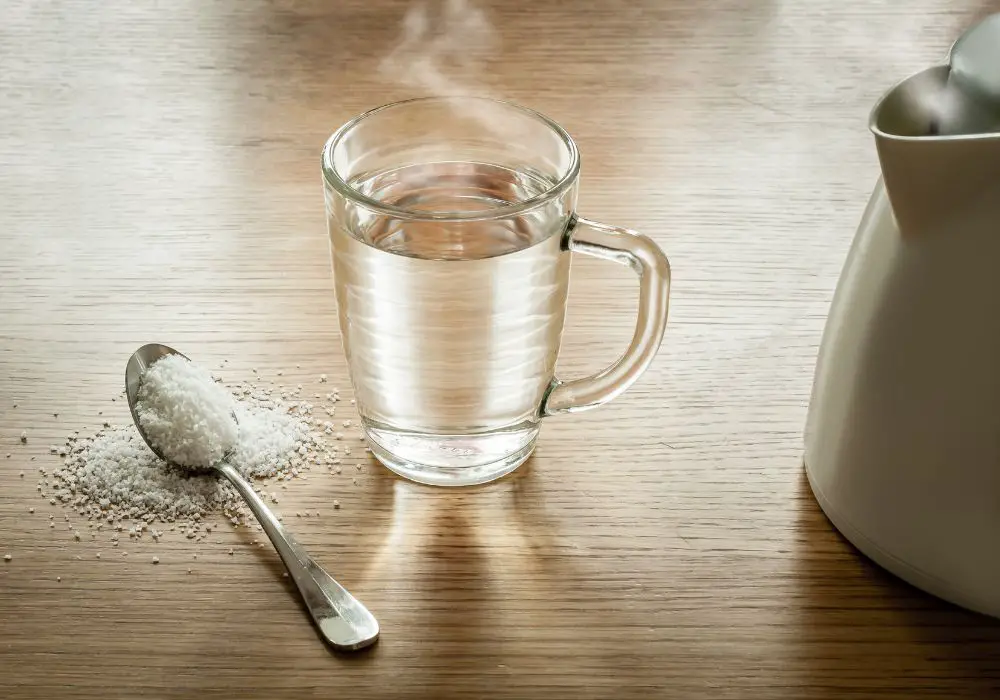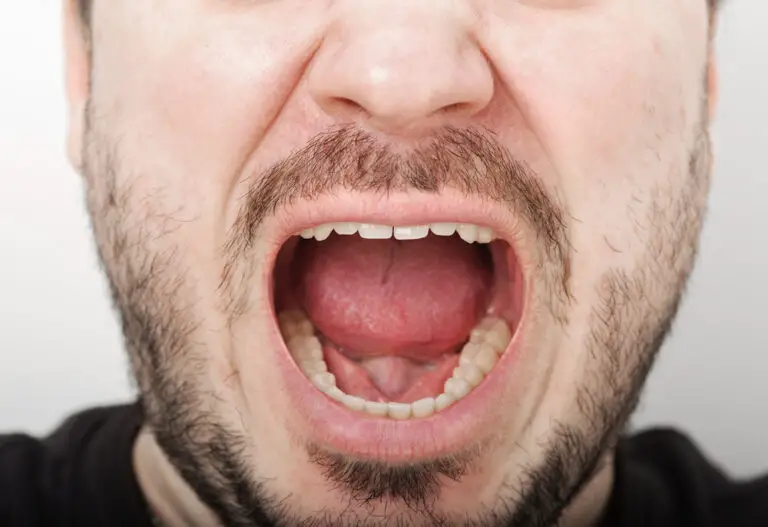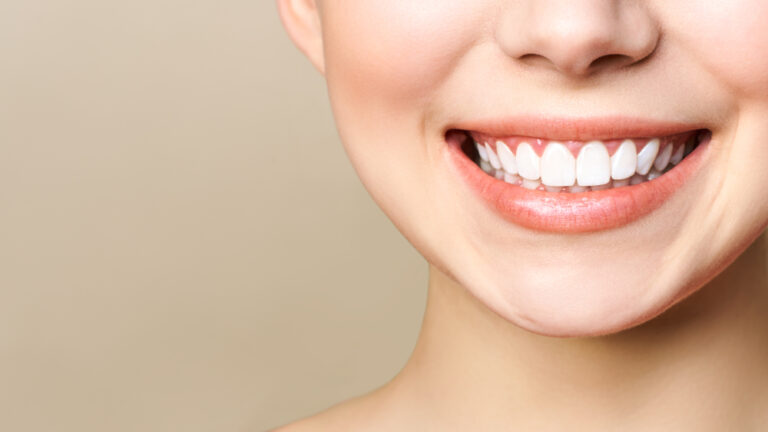Using salt water as an oral rinse has become a popular natural remedy for various dental and mouth problems. The salt acts as an antimicrobial and helps reduce inflammation, while the rinse action cleanses the teeth and gums. But a common question is if you should brush your teeth soon after using a saline mouthwash or wait a period of time before brushing.
There are pros and cons to consider regarding brushing right after salt water use. In this comprehensive guide, we will take a detailed look at:
- The possible benefits of brushing soon after saltwater rinsing
- The potential drawbacks and risks of brushing too soon
- How long you should ideally wait before brushing after a salt rinse
- The proper technique for using saline mouthwashes for maximum safety and efficacy
- The many proven oral health benefits that salt water rinses can provide
- Which dental and mouth conditions salt water is useful for treating
- The safety considerations of daily use of salt rinses
- Alternatives to use besides salt water for oral hygiene
- A FAQ section answering common questions about post-rinse brushing
By the end, you will have a thorough understanding of the best oral care practices involving salt water and brushing. Let’s explore each area in-depth:
Potential pros of brushing soon after salt water rinse
While most dentists suggest waiting a bit before brushing after a salt rinse, there are some possible advantages to brushing sooner:
- Removes food debris: If you use a salt rinse right after eating, brushing fairly soon can help clear away any bits of food, debris, or particles that may still be present between teeth or gumlines. Waiting too long to brush could allow these food remnants to sit and rot, potentially causing cavities or gum irritation.
- Prevents cavities: Any sugars, starches, or acids from food or drinks that may be lingering in the mouth can contribute to decay if not removed promptly. Brushing reasonably soon after an oral rinse can brush away these cavity-promoting substances before they demineralize tooth enamel.
- Freshens breath: The salty taste of the rinse itself may leave an unpleasant taste in the mouth that brushing can eliminate. Brushing removes bacteria that cause bad breath and leaves you with fresher breath.
- Apply fluoride: Brushing with a fluoride toothpaste allows you to spread fluoride across all tooth surfaces. Fluoride helps strengthen enamel and prevent cavities. The sooner you brush after the rinse, the sooner you get the decay-fighting benefit of fluoride.
So if you rinsed mainly to clean your mouth after a meal and don’t want food scraps sitting around, or you need to head out soon after rinsing, a quick gentle brush with toothpaste may be beneficial. Just take care not to scrub vigorously right after exposing your mouth to salt.
Potential cons of brushing too soon after salt water rinse
However, there are some disadvantages and risks to brushing too quickly after using a salt water wash. It’s generally best to wait at least 30 minutes if possible:
- Gum abrasion: The salt crystals can act as an abrasive on the sensitive gum tissue and easily cause irritation. If you brush too soon while some salt granules remain, they will get dragged across the gums and can cause small cuts, lesions or scratches. This leads to pain and damage.
- Loss of minerals: When salt water is swished in the mouth, some of the dissolved mineral ions get left behind and absorbed into the teeth. These minerals like calcium, phosphate, and others help strengthen and remineralize the tooth enamel. Brushing too soon won’t allow full absorption and will cause a loss of these beneficial minerals.
- Reduced efficacy: It takes some time for the saline solution to take full effect on teeth and gums in the mouth. The antimicrobial, anti-inflammatory, and cleaning action continues for some minutes after you spit it out. Brushing too early cuts this work short before maximum benefits are derived.
- Possible enamel damage: The physical friction of the brush bristles combined with any residual abrasive salt could potentially scratch or damage the enamel surface of your teeth if you brush vigorously right after rinsing. Enamel does not regenerate, so this damage is permanent.
To gain the most advantage from salt water rinses without causing harm, patience is a virtue when it comes to brushing.
How long should I wait to brush after a salt water rinse?

Dentists generally recommend waiting at least 30 minutes after using any type of salt water oral rinse before you brush your teeth. One hour is even better if you can wait that long.
Here are the reasons why this waiting period after salt water rinsing is recommended:
- It allows time for the salt solution to completely penetrate down into the crevices of your teeth and gums. The minerals in the salt water need sufficient exposure time to be fully absorbed into the porous tooth structure for remineralization. Rushing to brush too fast prevents this.
- Waiting an hour or so prevents the abrasive effect on your gums from any leftover salt crystals. The granules soften and dissolve with time after the rinse. Brushing after they have dissipated protects delicate gum tissue.
- The natural cleansing, antibacterial, anti-inflammatory, and healing effects of the salt water continue for some time after you swish and spit it out. Give it about 30 minutes of work time for maximum impact before you wash it all away by brushing.
- Waiting provides time for the minerals to adhere to your tooth enamel before you scrub them away. Brushing too early interferes with the remineralization process that strengthens enamel and wards off cavities.
However, if you absolutely must brush to clear food debris shortly after rinsing, do so gently using a soft-bristled brush. Avoid any harsh horizontal scrubbing motions and don’t press too firmly. Follow with a fluoride rinse to enhance the protective mineral layer on your teeth.
What is the proper technique for using salt water rinses?
To derive the full healing benefits from salt water mouthwashes, it’s important to use the proper technique:
- Use warm purified or filtered water rather than cold, as this enables the salt to dissolve fully and is more comfortable to hold in your mouth.
- Sea salt, Himalayan pink salt, or standard table salt can be used. Avoid flavored salts with additives. Ground salt dissolves best.
- The ideal concentration is about 1/2 to 1 teaspoon of salt per cup of warm water. Too little salt is ineffective, while too much can irritate.
- Take a mouthful of the solution and swish it vigorously around your entire mouth for 30 to 60 seconds before spitting it out. This exposure time is key.
- Repeat the swishing process at least twice with each use. Gargle with it for maximum cleansing.
- Limit use to 1-2 times daily at most. Using salt water more often risks overexposure of tissues.
- Refrain from swallowing any of the solution, as a high salt content can upset your stomach and digestive system if ingested.
- After rinsing, avoid eating or drinking anything for about 30 minutes to allow the salt water benefits to linger.
Following this proper technique allows salt water to work optimally in your mouth for cleaner, healthier teeth and gums.
What are the evidence-based benefits of salt water mouth rinses?

Daily oral salt water rinses have been scientifically demonstrated to provide many beneficial effects:
- Kills germs: The salt functions as an antimicrobial agent, working to actively reduce levels of oral bacteria. This includes strains like Streptococcus mutans that contribute to cavities and gum infections.
- Reduces inflammation: Salt possesses anti-inflammatory properties, so salt water can decrease swollen, inflamed gums caused by gingivitis or periodontitis. The rinse is soothing rather than irritating.
- Cleanses debris: Swishing dislodges trapped food particles, mucus, and other debris from between teeth and around gumlines where brushing can’t reach. This cleansing action of the moving water benefits gum health.
- Stimulates saliva: The presence of salt appears to trigger increased saliva production. Since saliva helps buffer acids and remineralize enamel, this is beneficial. The added saliva production also keeps the mouth from drying out.
- Promotes healing: Salt water facilitates the body’s natural healing abilities, allowing gum tissue damage from infections like gingivitis to heal faster. Wounds related to mouth ulcers, burns or dental procedures also heal quicker with the help of salt.
- Remineralizes teeth: The dissolved mineral ions in the saline rinse provide a ready source of calcium, phosphate, and trace minerals. Absorbing these minerals helps damaged tooth enamel remineralize and strengthen.
- Freshens breath: The cleansing antimicrobial rinse washes away sulfur compounds from bacteria that cause halitosis. By reducing the bacterial load, smelly breath is minimized.
Research confirms the oral health benefits of properly used salt water mouthwashes. They serve as a simple, affordable adjunct to brushing and flossing for better dental hygiene.
What dental conditions can salt water rinses help treat?
Daily salt water rinsing is an effective supplemental therapy for a number of common oral health conditions:
- Gingivitis: The salt decreases inflammation and bacteria to help treat mild cases of gum infection caused by plaque buildup. Used along with brushing, it may slow or stop gingivitis progression.
- Periodontitis: Salt water may reduce periodontitis risks by keeping bacterial plaque growth in check. It is often recommended after deep cleanings of periodontal pockets.
- Canker sores: Swishing with salt water can decrease pain and help canker sores heal up to 7 days faster compared to no treatment, by suppressing bacteria and inflammation.
- Braces irritation: Salt water soothes irritated gums and mouth ulcers stemming from new braces. But limit use to avoid excessive corrosion of wires.
- Dental procedures: Many dentists advise patients to rinse with salt water after procedures like tooth extractions, fillings, or implants. This prevents infection and aids healing.
- Thrush: Due to the natural antifungal properties of salt, rinses can help treat oral thrush overgrowth caused by Candida fungus.
- Dry mouth: Salt stimulates salivation, helping provide relief for chronically dry mouth. But overuse may worsen dryness, so limit frequency.
With proper technique, salt water provides a simple, time-tested home remedy to help treat a number of minor dental woes, either alone or alongside other treatments. Always consult your dentist about using it for any major oral health condition.
Is daily use of salt water mouth rinse safe?

For most healthy adults and children over six years old, using salt water as a daily oral rinse is safe when some basic precautions are followed:
- Dilute salt properly to avoid high concentrations that could cause irritation or be harmful if swallowed. 1/2 to 1 teaspoon salt per cup water is ideal.
- Don’t use more than twice daily to avoid overexposure of mouth tissues to salt.
- Take care not to vigorously swish and gargle if you have any mouth abrasions, wounds or ulcers. Rinse gently.
- Avoid getting water overly salty. Rinse carefully if you have braces or dental work like crowns or bridges.
- Don’t rinse right before dental procedures or adjustments. The salt could interfere with numbing, bonding, etc.
- Stop use if any worrisome symptoms develop like pain, numbness/tingling, or major changes in taste sensation.
- Consult your dentist before use if you have serious dental issues beyond mild gingivitis, or medical conditions like hypertension or kidney problems.
With judicious use, salt water mouthwash is unlikely to pose any risks for healthy individuals. But be cautious if you have braces, recent dental work, or any medical conditions. Check with your dentist if unsure about daily use.
What natural oral rinse alternatives exist besides salt water?
If for any reason you require an alternative to salt water mouth rinses, some options to consider include:
- Baking soda – Creates an alkaline environment to discourage bacterial growth. 1/2 teaspoon in water.
- Hydrogen peroxide – Rinses away debris and kills germs via its effervescence. Use diluted 1 tablespoon in 1/2 cup water.
- Aloe vera juice – Soothes inflamed gums and pain from canker sores. Use 100% pure gel.
- Green tea – Contains antioxidant polyphenols like catechins that reduce oral bacteria. Brew strong tea, cool, and rinse.
- Sage tea – The tannins in sage have antibacterial and wound healing abilities. Brew as a tea.
- Xylitol – This natural sugar alcohol can help inhibit cavity-causing Streptococcus mutans bacteria. Use xylitol mouthwash.
- Essential oils – Oils like peppermint, tea tree, thyme help fight bad breath and gum problems. Add a couple drops to water.
- Coconut oil – Swishing with extra virgin coconut oil helps cleanse mouth bacteria and fungi. Use 1 to 2 teaspoons.
Any of these alternatives should be diluted properly with water and used short-term to check for any allergic reactions before daily use. While these options may help maintain oral health, consult your dentist about relying on them solely to treat any major dental conditions in lieu of salt water.
Frequently Asked Questions about brushing after salt rinses
1. Why can’t I brush my teeth immediately after using a salt water mouth rinse?
Brushing right away can damage gums and enamel still exposed to salt crystals. It also removes minerals before they fully absorb and doesn’t give the antimicrobial effects time to work optimally. Waiting 30 to 60 minutes is best.
2. Is it okay to gently brush debris off my teeth soon after a salt rinse?
If necessary, you can gently clear away food debris shortly after rinsing. Use a soft brush and avoid vigorous horizontal motions that can abrade your gums. Don’t over-brush. Follow with fluoride rinse.
3. Can I use regular mouthwash right after finishing a salt water rinse?
Yes, you may use a non-alcohol mouthwash soon after salt water, especially to maximize the cleansing and freshening effects. Alcohol mouthwashes may cause a temporary stinging sensation on the gums.
4. Why use warm water rather than cold for oral salt rinses?
Warm water enables the salt to dissolve fully so the solution can work most effectively. It also feels more comfortable and soothing when you swish the rinse around your mouth.
5. If I have braces, how often can I safely use salt water rinses?
With braces, limit use to 2 or 3 times per week at most. More frequent may start corroding wires or brackets. Avoid use right before adjustments, and rinse carefully to prevent damage.
Conclusion
Salt water mouth rinses provide an easy, cost-effective supplemental therapy for better oral hygiene and a natural treatment for minor dental woes. With proper technique and dilution, they are quite safe for regular use. But refrain from brushing right after rinsing with salt water. Allow about 30 to 60 minutes for the beneficial effects to fully occur before brushing and rinsing it all away. Patience pays off for obtaining the optimal antimicrobial, anti-inflammatory, and remineralization benefits that salt has to offer for your oral health.






